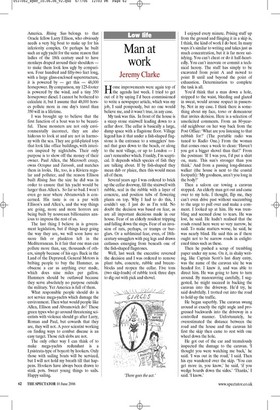Low life
Man at work
Jeremy Clarke
Home improvements were again top of the agenda last week. I tried to get out of it by saying I’d been commissioned to write a newspaper article, which was my job, I said pompously, but no one would believe me, and it wasn’t true, in any case.
My task was this. In front of the house is a steep stone stairwell leading down to a cellar door. The cellar is basically a large, damp space with a flagstone floor. Village legend has it that under a fish-shaped flagstone is the entrance to a smugglers’ tunnel that goes down to the beach, or along to the next village, or up to London — I can’t remember which. Frankly, I’m sceptical. It depends which species of fish they are talking about. If by fish-shaped they mean dab or plaice, then this would mean all of them.
Several years ago I was ordered to brick up the cellar doorway, fill the stairwell with rubble, seal in the rubble with a layer of concrete, and position tubs of flowering plants on top. Why I had to do this, I couldn’t say. I just do as I’m told. No doubt the decision was based on fear, as are all important decisions made in our house. Fear of an elderly resident tripping and falling down the steps. Fear of an invasion of rats, perhaps, or tramps or burglars. Or a subliminal fear, even, of 18thcentury smugglers with peg legs and drawn cutlasses emerging from beneath one of the fish-shaped flagstones.
Well, last week the executive reversed the decision and I was ordered to remove plant tubs, concrete, rubble and breezeblocks and reopen the cellar. Five tons (two skip-loads) of rubble took three days to dig out with pick and shovel. I enjoyed every minute. Prising stuff up from the ground and flinging it in a skip is, I think, the kind of work I do best. In many ways it’s similar to writing and takes just as much concentration, but it is far more satisfying. You can’t cheat or do it half-heartedly. You can’t innovate or commit a technical heresy. The stuff has simply to be excavated from point A and moved to point B until and beyond the point of exhaustion. Determination to complete the task is all.
You’d think that a man down a hole, stripped to the waist, bleeding and glazed in sweat, would arouse respect in passersby. Not in my case. I think there is something about my face, torso or demeanour that invites derision. Here is a selection of unsolicited comments. From an 80-yearold neighbour on her way back from the Post Office: ‘What are you listening to that rubbish for?’ (The portable radio was tuned to Radio One.) From the woman that comes once a week to clean: ‘Haven’t you got a bigger shovel than that?’ From the postman: ‘If I was you, I’d put a shirt on, mate. This sun’s stronger than you think.’ And from a passing long-distance walker (the house is next to the coastal footpath): ‘My goodness, aren’t you long in the body?’ Then a saloon car towing a caravan stopped. An elderly man got out and came over to my hole. I thought, flip me, they can’t even drive past without succumbing to the urge to pull over and make a comment. I looked up at him. He was trembling and seemed close to tears. He was lost, he said. He hadn’t realised that the roads round here were so very narrow, he said. To make matters worse, he said, he was nearly blind. He said this as if there ought not to be narrow roads in enlightened times such as these.
Then he pushed a scrap of trembling paper under my nose. On it, in shaky writing, like Captain Scott’s last diary entry, was the name of the caravan site he was headed for. I knew it, and was able to direct him. He was going to have to turn around. By manoeuvring carefully, I suggested, he might succeed in backing the caravan into the driveway. He’d try, he said doubtfully. I trotted out into the road to hold up the traffic.
He began superbly. The caravan swung around at exactly the right angle and progressed backwards into the driveway in a controlled manner. Unfortunately, he overestimated the distance between the road and the house and the caravan hit first the skip then came to rest with one wheel down the hole.
He got out of the car and tremulously inspected the damage to the caravan. ‘I thought you were watching me back,’ he said. ‘I was out in the road,’ I said. Then his eye wandered over the skip. ‘You can get more in, you know,’ he said, ‘if you wedge boards down the sides.’ ‘Thanks,’ I said. ‘I know.’


















































































 Previous page
Previous page